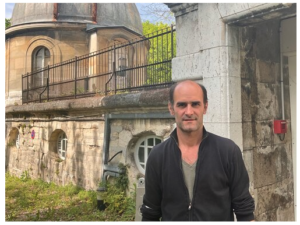A 2-year Scientific collaborator position at the Royal Observatory of Belgium, for remote atomic clock comparisons using the GNSS signals.
Application deadline is July 08, 2022. See here for job description and how to apply.
Microwave Electronics Product Architect specializing in Local Oscillators permanent position available at Thales Alenia Space, Toulouse.
Microwave Electronics Product Architect specializing in Local Oscillators permanent position is available at Thales Alenia Space, Toulouse. Start date: As soon as possible. See here for job description and how to apply.
Financial manager and accountant position available on fixed-term contract for one year, renewable, at the LPL (CNRS et USPN).
A Financial manager and accountant position available on fixed-term contract for one year, renewable, at the Laboratoire de Physique des Lasers (CNRS et USPN), Villetaneuse campus. The position may lead to the opening for a competition of a CNRS civil servant position. Expected starting date: September 1, 2022. See job description here. Apply here.
International Conference on “Quantum sensors and tests of new physics” October 5th-7th 2022 in Hotel Wienecke XI, Hannover (Germany).
The conference is organized and funded by the Collaborative Research Center DQ-mat and the Cluster of Excellence Quantum Frontiers. Participation is free of charge. As the number of participants is limited, available places will be allocated by a scientific committee on the basis of the submitted abstracts. Registration deadline is June 30th.
More information can be found on the homepage https://www.conference-qsnp.uni-hannover.de/
Postdoctoral position in experimental optics at ARTEMIS (Nice), 12 months with possibility of 18 additional months!
A postdoctoral position in experimental optics at ARTEMIS (Nice) to work on “Mitigation of Optomechanical Parametric Instability in next generation of Gravitational Wave Detectors”. Contract period: 12 months with possibility of 18 additional months. Expected starting period: September 2022. Please see Job description here.
FIRST-TF 2022 General Assembly – October 4 and 5, 2022 at ENSMM (Besançon): SAVE THE DATE!
FIRST-TF 2022 General Assembly will take place on October 4 and 5, 2022 at ENSMM (Besançon). The program as well as the details of this GA will be communicated very soon. Please, save the date.
Research and Teaching Assistant position in GNSS available at the University of Liege (Belgium).
The Geomatics unit of the University of Liege hires a teaching and research assistant for a period of 2 years starting on 15 September 2022. At the end of this 2-year period, the contract may be renewed 2 times for a period of 2 years (i.e. a total of 6 years). Research and teaching activities will each represent 50% of the activities. Application deadline is June 15, 2022. Applications (scientific CV and motivation letter) should be sent to Rene.Warnant@uliege.be. For more information, please see Job description here.
Sylvain Ballandras laureate of the 2022 Cady Award

The Cady Award 2022 goes to Dr. Sylvain Ballandras, ”For outstanding contributions to the modeling and development of crystal resonators and sensors.”
The W. G. Cady Award is to recognize outstanding contributions related to the fields of piezoelectric or other classical frequency control, selection and measurement; and resonant sensor devices.
Sébastien Bize laureate of the 2022 European Frequency and Time Award of the European Frequency and Time Forum
 The EFTF Award 2022 goes to Dr. Sébastien Bize, “For outstanding contributions to the development of microwave and optical frequency standards for tests of fundamental physics and the realization of the SI second.”
The EFTF Award 2022 goes to Dr. Sébastien Bize, “For outstanding contributions to the development of microwave and optical frequency standards for tests of fundamental physics and the realization of the SI second.”
The European Frequency and Time Award recognizes outstanding contributions in all fields covered by the EFTF.
A 1-year Post-doctoral researcher (H/F) position, renewable 1 year, available at FEMTO-ST (Besançon) to work on “Microcell-based optical clocks”.
The candidate will be responsible for:
-Contribution to the development of microcell-based optical clocks.
-Contribution to the design (mecanics/temperature/optics), development and test of integrated microcell-based physics packages.
-Contribution to the test of alkali vapor microfabricated cells (Cs and Rb)
-Metrological characterization of frequency stability performances of lasers stabilized onto microcells through beatnote measurements between two quasi-identical systems or against a cavity-stabilized laser
-Collaboration with a PhD student working on the experiment since 10/2021.
-Contribution to the writing of publications and participation to international conferences
Applications deadline is Monday, 30 May 2022.
Job description here: postdoc_MHO_2022_en
Apply here: https://emploi.cnrs.fr/Offres/CDD/UMR6174-RODBOU-001/Default.aspx
